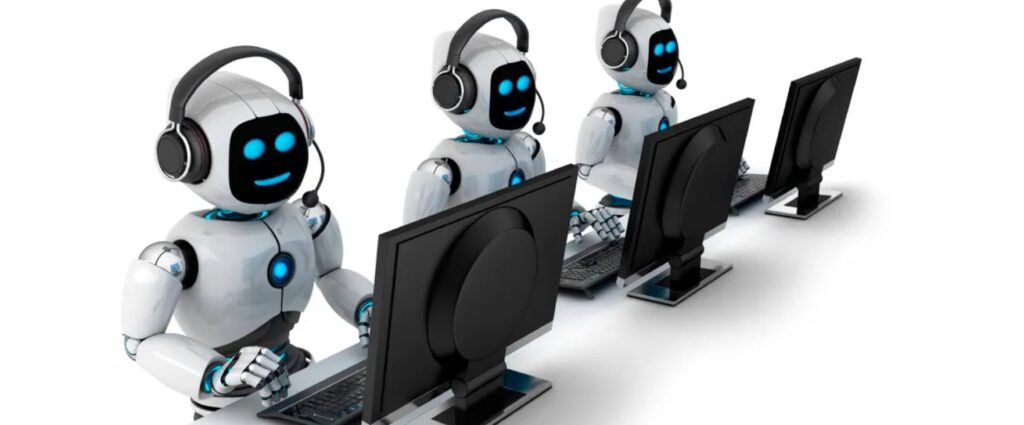Can AI replace customer service agents?
Can AI Replace Customer Service Agents?
In recent years, artificial intelligence (AI) has emerged as a transformative force in numerous industries, including customer service.
As AI technologies continue to advance, businesses and customers alike are left questioning: Can AI truly replace human customer service agents?
In this blog post, we’ll delve into this fascinating topic, examining the advantages and limitations of AI, its role in shaping the future of customer service, and whether it is poised to fully replace human agents.
The Rise of AI in Customer Service
AI has become an integral part of modern customer service, From automated chatbots to AI-driven call centres, these technologies promise faster, more efficient service delivery.
What is AI in Customer Service?
AI in customer service refers to the use of intelligent algorithms to handle customer queries, resolve issues, and provide support. Examples include virtual assistants like Apple’s Siri or Amazon’s Alexa, as well as chatbots that operate on company websites or messaging apps like Zendesk AI Chatbot.
Examples of AI in Action
Many organisations have adopted AI-powered solutions to streamline their customer service processes. For instance, Amazon’s AI chatbots assist millions of customers daily, answering questions about orders, returns, and product recommendations. Similarly, British Airways uses AI to enhance customer interactions, offering tailored suggestions and resolving queries swiftly.
Benefits to Businesses
For companies, AI offers a host of benefits. It reduces operational costs by minimising the need for large teams of human agents and provides round-the-clock availability. Furthermore, AI ensures consistency in responses, making it an attractive solution for managing large volumes of customer interactions.
The Advantages of AI in Customer Service
AI brings several significant advantages to the table, making it an appealing option for businesses aiming to optimise their customer service operations.
1. 24/7 Availability
Unlike human agents, AI systems are not constrained by working hours. They can operate continuously, ensuring customers receive immediate responses at any time of day or night.
2. Cost Efficiency
By automating repetitive tasks and reducing the need for extensive staffing, AI helps companies save on overheads while maintaining high levels of customer support.
3. Consistency
AI delivers uniform responses, eliminating variations caused by human error. This consistency builds customer trust and reinforces brand reliability.
4. Scalability
AI can handle a large number of inquiries simultaneously, something human teams cannot achieve without significant expansion. Tools like LivePerson AI and HubSpot Chatbot demonstrate this scalability effectively.
5. Personalisation Through Data
AI can analyse past interactions and customer preferences to deliver personalised experiences. For example, recommending products based on previous purchases enhances customer satisfaction and boosts sales. Platforms like Salesforce Einstein specialise in using AI for tailored customer service.
The Limitations of AI in Customer Service
Despite its advantages, AI has notable limitations that prevent it from fully replacing human customer service agents.
1. Lack of Emotional Intelligence
One of the most significant shortcomings of AI is its inability to understand or respond to human emotions. Tools like Hootsuite Insights aim to track sentiment but cannot replicate genuine empathy.
2. Limited Problem-Solving Skills
AI excels in addressing routine queries but struggles with complex or unique issues requiring human judgment and creativity. For instance, resolving a nuanced complaint or understanding cultural context may be beyond AI’s current capabilities.
3. Dependence on Data
AI relies on the quality of data it is trained on. Inaccurate, incomplete, or biased data can result in flawed responses, negatively impacting customer satisfaction.
4. Customer Frustration
Some customers find interactions with AI frustrating, particularly when their issue requires escalation to a human agent. The inability of AI to fully address their needs can lead to dissatisfaction.
5. Ethical Concerns
The adoption of AI in customer service raises ethical questions, including the displacement of human jobs and the potential misuse of customer data. These concerns require careful consideration by businesses. The AI Ethics Lab provides insights into managing these challenges.
Can AI Fully Replace Customer Service Agents?
While AI has changed aspects of customer service, the idea of fully replacing human agents remains contentious.
Hybrid Models: AI + Human Collaboration
Many businesses adopt a hybrid approach, combining AI for routine tasks with human agents for more complex issues. This synergy ensures efficiency while retaining the human touch essential for building strong customer relationships.
The Importance of Human Empathy
Customer service often hinges on empathy and understanding—qualities that are uniquely human. For industries like healthcare or hospitality, where sensitive situations are common, human agents remain indispensable.
Technological Advancements
AI technologies, such as Google’s Dialogflow and IBM Watson Assistant, are improving rapidly. However, mimicking the nuanced nature of human communication remains a significant challenge.
Customer Preferences
Surveys consistently show that while customers appreciate the efficiency of AI, many still prefer speaking with human agents for personalised or high-stakes inquiries. This preference underscores the continued importance of human interaction in customer service.
The Future of AI in Customer Service
Looking ahead, AI is set to play an increasingly prominent role in customer service. However, its future lies in collaboration rather than outright replacement.
AI Evolution
Advancements in machine learning and natural language processing will enable AI to handle more complex queries. Tools like OpenAI continue to push the boundaries of what AI can achieve in communication.
Collaboration with Human Agents
The future of customer service will likely involve AI and humans working together. AI can handle routine inquiries, freeing up human agents to focus on complex, strategic tasks that require creativity and empathy.
Upskilling Human Agents
AI can help human agents upskill by handling mundane tasks, allowing them to develop expertise in problem-solving and customer relationship management.
Shifting Customer Expectations
As customers become accustomed to AI-driven support, their expectations will evolve. Businesses must ensure a seamless transition between AI and human agents to maintain high levels of customer satisfaction.
Conclusion
AI is undoubtedly reshaping the customer service landscape, offering unparalleled efficiency, scalability, and cost savings. However, its limitations in emotional intelligence, problem-solving, and ethical considerations mean it cannot fully replace human agents.
The future of customer service lies in a harmonious blend of AI and human collaboration, leveraging the strengths of both to deliver exceptional customer experiences.



















